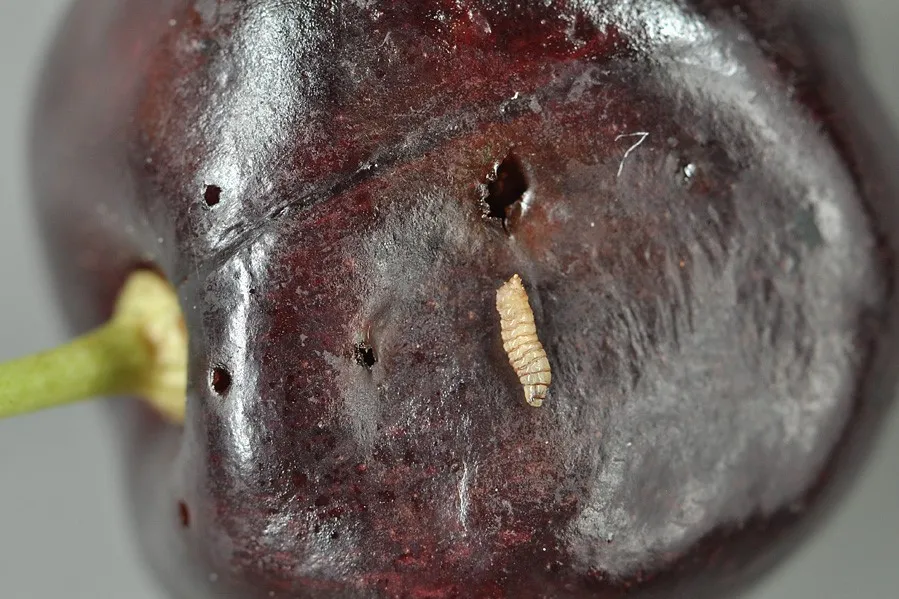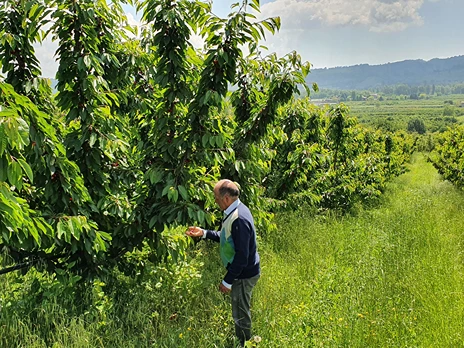Sweet and sour cherries, as well as other Prunus species, are vulnerable to several potentially harmful viruses, such as Prunus necrotic ringspot virus (PNRSV). This virus can be transmitted through various means, including grafting, pruning, pollen, insects (e.g. aphids and leafhoppers) and underground pests (e.g. nematodes).
Although sweet cherry cultivars generally show minimal or no symptoms of PNRSV infection, some specific virus strains can induce rugose mosaic disease, a condition that negatively affects fruit quality and ripening time as well as general plant health status.
Regarding rootstocks, on the other hand, tolerance, or hypersensitivity to prevalent viruses, including PNRSV, varies. However, if a cherry cultivar is tolerant to a particular PNRSV strain but the rootstock is not, when the virus reaches the grafting point a hypersensitivity reaction will occur, which may lead to vascular necrosis, eventually culminating in the death of the tree.
Traditionally, the selection of virus-resistant cultivars is uncommon as it is expensive and time-consuming due to problems such as heterozygosity, the long juvenile phase of the plants and the absence of natural sources of resistance. Although genetic engineering has the potential to enable the integration of single or multiple genes into established sweet cherry genotypes, the implementation of such strategies has been hampered by concerns about transgene flow and exogenous protein production.
Furthermore, like many perennial woody fruit crops, the genetic transformation of cherries is currently a complex and irregular process. Individually transforming each of the varieties currently on the market would require an enormous amount of time and resources.
One of the most promising approaches to increase plant resistance to viruses is post-transcriptional gene silencing, which employs RNA interference (RNAi) to prevent pathogenicity and virus replication. The research conducted by researchers at Michigan State University (USA) used a specific vector to introduce resistance to PNRSV infection in two hybrid cherry rootstocks, 'Gisela 6' and 'Gisela 7', which were tolerant and susceptible to PNRSV infection, respectively.
One year after receiving PNRSV plus Prune Dwarf Virus as inoculant, the non-transgenic 'Gisela 6' rootstocks showed no symptoms but a considerable PNRSV titre, whereas in transgenic 'Gisela 6' showed no symptoms and a negligible PNRSV titre.
Unlike their transgenic counterparts, non-transgenic trees grafted onto 'Gisela 7' died. The results of this study indicate that the use of RNA interference to develop viral resistance in fruit rootstocks is feasible.
The implementation of RNAi to create transgenic rootstocks could potentially increase the yield of conventional and non-genetically modified fruit varieties while circumventing the challenges associated with transgene flow and exogenous protein synthesis that are inherent to transformed fruit genotypes
The results illustrate the efficacy of RNA interference-mediated gene silencing in promoting viral resistance in cherry rootstocks. The use of resistant transgenic rootstocks offers exceptional resources to study: (i) the production of commercial non-GM fruit cultivars through the use of transgenic rootstocks and (ii) the prevention, reduction or elimination of viral infection in scion cultivars grafted onto the transgenic rootstock.
Source: Song, G.-q., Sink, K.C., Walworth, A.E., Cook, M.A., Allison, R.F. and Lang, G.A. (2013), Engineering cherry rootstocks with resistance to Prunus necrotic ring spot virus through RNAi-mediated silencing. Plant Biotechnol J, 11: 702-708. https://doi.org/10.1111/pbi.12060.
Melissa Venturi
University of Bologna (IT)
Cherry Times - All rights reserved










